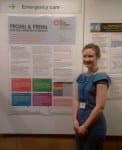Members of the Community and Health Research Unit from the University of Lincoln recently attended the combined Society of Academic Primary Care and RCGP Annual Scientific Meeting in Glasgow where they were selected to give five oral presentations on some of the team’s current research into cardiovascular disease, adult vaccination and insomnia treatment. The conference provided a wonderful opportunity for junior and senior members of the team to present work at an international conference. 
Category Archives: Events
Improvement science and methods seminars: case control and self controlled case series designs
A new series of Improvement Science and Method Seminars led by Zahid Asghar, senior lecturer in health, began with our first workshop on 19 October 2012. Zahid led the attendees, which included academic and health service staff working with the Community and Health Research Group, through case-control studies and touched  on the self-controlled case series method. There have been only forty or so studies published using this novel method in the worldwide literature including one study published by the team last year in the prestigious Vaccine: Gwini SM, Coupland C, Siriwardena AN. The effect of influenza vaccination on risk of acute myocardial infarction: self-controlled case-series study. Vaccine 2011; 29: 1145-1149.
on the self-controlled case series method. There have been only forty or so studies published using this novel method in the worldwide literature including one study published by the team last year in the prestigious Vaccine: Gwini SM, Coupland C, Siriwardena AN. The effect of influenza vaccination on risk of acute myocardial infarction: self-controlled case-series study. Vaccine 2011; 29: 1145-1149.
Zahid is currently working on an NIHR Research for Patient Benefit study looking at the possible association between influenza or pneumococcal vaccination and stroke or transient ischaemic attack (TIA) (IPVASTIA), which he used to illustrate the two study types. There have been a number of studies investigating the link between respiratory infections as a trigger for heart attack or stroke and the possible protective effect of influenza vaccination including a study published by the group in the Canadian Medical Association Journal two years ago: Siriwardena AN, Gwini S, Coupland C. Influenza vaccination, pneumococcal vaccination, and the risk of acute myocardial infarction: matched case-control study. Canadian Medical Association Journal 2010; 182 (15): 1617- 1623.
ENACT study presented in Gothenburg at European Forum
A recently completed study, ‘Integrating online communities and social networks with computerised treatment for insomnia: a qualitative study of service user and multiprofessional primary health care perspectives’ was presented by Prof Niro Siriwardena in the e-health session of the fourth biannual conference of the European Forum for Primary Care: The Future of Primary Healthcare in Europe IV held in September in Gothenburg’s Museum of World Culture in Sweden.
of the European Forum for Primary Care: The Future of Primary Healthcare in Europe IV held in September in Gothenburg’s Museum of World Culture in Sweden.
The study authors also included Jo Middlemass, Dr Zowie Davy, Dr Kate Cavanagh, Dr Conor Linehan, Professor Kevin Morgan and Professor Shaun Lawson. The study was funded by the EPSRC Healthcare Partnerships programme and is the first study in a wider project, ‘Exploring social Networks to Augment Cognitive behavioural Therapy (ENACT)’.
ENACT aims to design and test a novel mode of delivery of treatment for sleep problems including mobile phone technology, electronic assessment of sleep and computerised cognitive behavioural therapy for insomnia (CCBT-I). The study involved interviews and focus groups with service users and health professionals to elicit beliefs and intentions that might facilitate or create barriers to the uptake and adherence to CCBT-I.
The study is due to be presented at the Society for Academic Primary Care in Glasgow and to be published in the British Journal of General Practice later this year.
Public presentation of research findings to get blood pumping
Scientists will stage a public presentation where they will reveal exciting research findings which could potentially help prevent people from developing diseases of the blood vessels in later life.
A team of academics from the Community and Health Research Group at the University of Lincoln have just completed a pilot study into the effects of exercise and nutrition on the efficient working of small blood vessels in people aged 50 and over.
The researchers are holding a free public lecture where they will present their key findings and discuss the potential significance. There will also be opportunities for audience members to pose questions.
The event takes place on Friday 25th May 2012 in the EMMTEC building on the University’s main Brayford Pool Campus. It runs from 12pm-2pm. Admission is free and members of the public are welcome to attend.
The presentation will be delivered by Dr. Markos Klonizakis, a Research Fellow in the School of Health and Social Care at the University of Lincoln who specialises in the study of the small veins of the human body, and his co-researchers Geoff Middleton, Dr. Ahmad Alkhatib and Dr. Mark Smith.
The team spent eight weeks working with volunteers to assess the effect of changes to exercise and diet on the efficiency of blood flow in the small blood vessels – known as the microvascular system. Internal damage to these vessels is thought to be responsible for some common circulatory diseases, particularly varicose veins and leg ulceration.
Results from their pilot study were very positive, suggesting potential health benefits for all, but especially for older people, who due to the effects of ageing are more at risk of developing circulatory problems.
Dr. Klonizakis said: “This was a pilot study, but the results are exciting and point the way for further research. We felt it was important to share these early findings not just with the academic community, but also anyone with an interest in health. This presentation will be a chance for members of the public to hear more about our experiment and ask questions about what the results might mean.”
Admission to the presentation is free to attend but places are limited. To confirm a place, email Dr. Klonizakis at: mklonizakis@lincoln.ac.uk
ASCQI presented at International Forum on Quality and Safety in Health Care in Paris, April
 In April 2012 Professor Niro Siriwardena and Fiona Togher travelled to Paris with colleagues, Nadya Essam, Debbie Shaw (East Midlands Ambulance Service [EMAS]) and David Francis (East of England Ambulance Service) to attend the 17th International Forum on Quality and Safety in Healthcare.
In April 2012 Professor Niro Siriwardena and Fiona Togher travelled to Paris with colleagues, Nadya Essam, Debbie Shaw (East Midlands Ambulance Service [EMAS]) and David Francis (East of England Ambulance Service) to attend the 17th International Forum on Quality and Safety in Healthcare.
The team presented work undertaken as part of the Ambulance Service Cardiovascular Quality Initiative (ASCQI) a two year nationwide project involving all 12 ambulance trusts in England and the University of Lincoln funded by the Health Foundation.
From the 2,000 poster submissions that were originally received, around 900 were selected for display following a two stage peer review process. Fiona, Nadya and Debbie were all invited to present their work during the poster presentation session held. This provided a brilliant opportunity to talk to interested delegates from around the world about the quality improvement work and research that is being undertaken at the University and East Midlands Ambulance Service.
Fiona represented the IS-PROVE team, which also includes Professor Siriwardena and Dr Zowie Davy. Their poster entitled “The importance of qualitative methods for generating patient reported outcome measures and patient reported experience measures for pre-hospital and emergency care of stroke and heart attack” attracted attention from French, Swedish and American delegates that were keen to find out more. Nadya Presented on ergonomic redesign to improve care for heart attack and Debbie presented on ‘Joining the dots’ and the use of annotated control charts for quality improvement in ASCQI.
With a tough act to follow from last years’ excellent event in Amsterdam, Paris was just as enjoyable, thought provoking and inspiring. The key note speakers were again outstanding and captivated the audiences with their motivational reflections on working in health care and how to improve the quality of care provided to patients.
The opening keynote by Maureen Bisagnano from the Institute for Healthcare Improvement focused on goal oriented patient care, ‘what matters to patients’ and the redesign of services for patients. We heard about leadership from Dr David Williams, a Canadian professor of surgery who has been an astronaut and now leads a regional health organisation in Toronto.
Another highlight of the conference was the session entitled “Delivering better care to rural communities inAfrica” which focused on the application of quality improvement methods including Plan, Do, Study, Act cycles, to reducing asphyxia in newborn babies and mortality rates in children under the age of five. The success of the initiatives was amazing, more so because of the limited resources of equipment and manpower available.
One of the most inspiring speeches was given by Dr. Nancy Snyderman, who is not only a paediatrician and an ENT surgeon but also chief medical editor for NBC news in America – and an award winning journalist! Her speech focused on the importance of listening to patients and hearing what they are actually saying as opposed to what health care professionals presume they are saying. This central message resonated with what we are aiming to achieve through the patient experience studies that we are conducting in prehospital care in Lincoln and EMAS.
The take home message from this conference was that the application of quality improvement methodologies makes a real difference to the standard of care that is provided to patients; there were hundreds of examples of fantastic successes from around the world and in some instances the evidence translated to a significant contribution of quality improvement projects to saving lives.
Fiona Togher and Niro Siriwardena


